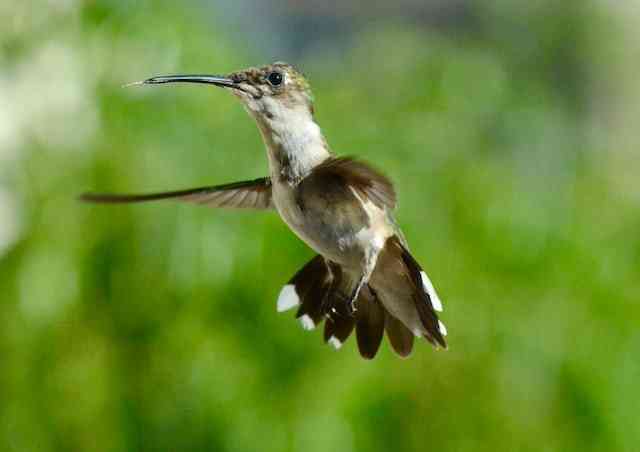Do Hummingbirds Make Noise? (Yes, But…)
When you imagine the tranquil scene of hummingbirds hovering around a field of flowers, you may associate it with a peaceful silence. Yet, as vibrant and fast as they appear, the birds are far from mute.
The problem with identifying the sounds made by hummingbirds is that they sound very similar. Many of them don’t have extended songs, so it’s harder to hear them, even if you are accustomed to birding by ear.
So, do hummingbirds make noise?
Yes, they do. It might come in the form of a harsh “chit or a gentle “chip.” Perhaps, the most recognizable sound is the buzzing, humming, trilling, or zipping of their wings. This is often used as a means of identification.
In general, the exact sounds made by the bird depend on the species.

Why Do Hummingbirds Make Noise?
Hummingbirds make noise for various reasons, but primarily for communication. These may include warning other hummingbirds of potential danger, defending their territory, or attracting a mate. The sounds tend to vary depending on the specie.
For some hummingbirds, the most distinct sounds they make are nonvocal.
Humming Sound
Interestingly, the most recognizable sound associated with hummingbirds is the humming sound, which happens to be nonvocal. This high-frequency ‘hum’ is produced by the rapid fluttering of their wings. The wing beats can be so frantic and make clear humming, trilling, buzzing, and zipping sounds, which are often used to identify the bird.
The wingbeat frequency can range anywhere from 12-80 times per second, depending on the species. For example, the broad-tailed hummingbird creates a metallic zinging noise when it’s flying fast or diving but becomes silent as it hovers over something.
Vocalization
Besides their signature hum, hummingbirds make an array of vocal sounds.
Calls: Hummingbirds use calls for communication, often producing sharp, chip-like sounds or squeaks. The complexity of these calls varies among species, with some showcasing a range of up to 30 different sounds.
Chirps: They also create a chirp-like noise, especially when they feel threatened or when intruders are near their territory. Instead of showing aggression and trying to chase the intruders, they may chip or perch to ward them off.
Songs: Male hummingbirds produce unique songs during courtship displays. These melodious sounds, although not as complex as those of songbirds, are essential for attracting females.
Courtship
One of the most fascinating sound displays in the world of hummingbirds is the “dive bomb” courtship display. In species like the Costa’s Hummingbird, the male performs an impressive aerial display, diving from great heights at high speed. As he approaches the bottom of his dive, he produces a unique high-pitched sound.
Scientists have discovered that this sound is not vocal but rather created by the bird’s tail feathers’ vibration in the rapid dive. The noise serves to impress potential mates and warn off rivals, demonstrating the clever use of physics in the hummingbird’s mating ritual.
The sounds produced by a hummingbird can also give you an idea about its gender or age. For most species, the males are usually more vocal due to their increased aggressiveness. The same can be said of juveniles when hungry or trying to get attention from adults.
How Do Hummingbirds Make Noise?
Hummingbirds create sound in a unique way. The humming sound that is synonymous with their name is produced by the incredible speed at which they flap their wings.
Different species of hummingbirds have varying wingbeat frequencies, ranging from around 12-80 beats per second. This rapid movement causes the air to vibrate, creating the distinctive humming sound.
In addition to the humming sound, the birds also produce vocal noises.
Do Hummingbirds Make Loud Noises?
Yes, hummingbirds can make loud noises. Generally, the volume of the bird’s noise can change depending on its activity.
During regular activities such as feeding or flying, the sounds they produce are relatively quiet. However, during moments of stress, such as when they perceive a threat, their vocalizations can become louder.
Even so, compared to the vocalizations of many larger bird species and other environmental noises, the sounds produced by hummingbirds are not typically considered loud.
Do Hummingbirds Like Music?
There’s limited research on hummingbirds’ response to music. So, it’s difficult to say whether they like or do not like music.
Hummingbirds are primarily visual creatures, and their communication is mostly reliant on visual cues and their own vocalizations.
Loud music or abrupt noises can potentially cause stress, but ambient music is unlikely to have any significant effect on them.
In general, birds have demonstrated sensitivity to rhythm and pitch, which are key components of music. In fact, some hummingbirds, like the male Anna’s hummingbird, can sing.
How to Listen to Hummingbirds
If hummingbirds can be found in your area, then it’s possible to listen to them. Here are some ideas:
- Install a hummingbird feeder in your yard. This will attract hummingbirds, allowing you to observe and listen to them up close.
- Visit a local park or nature reserve that has a hummingbird population.
- Listen to recordings available online. Websites such as Xeno-Canto offer extensive collections of bird sounds, including those of various hummingbird species.
Other Related Questions about Hummingbirds and Noise
Why Do Hummingbirds Make a Clicking Noise?
Some hummingbirds are known to make a clicking noise, often as part of their alarm calls. This rapid succession of clicks can be triggered when they perceive a threat, such as a larger bird intruding into their territory. In some species, the clicking sound is also part of their courtship or territorial displays.
Do Baby Hummingbirds Make Noise?
Yes, they do! Also known as nestlings, baby hummingbirds do make noise, especially when they’re hungry. They produce a soft, high-pitched peeping sound to notify their parents they want to eat. As nestlings mature and become fledglings, their calls become louder and more distinctive.
Do All Hummingbirds Make Noise?
Yes, all hummingbirds make noise, but the type and manner of the noise usually vary across species. For instance, the Ruby-throated Hummingbird is known for its soft, twittering songs. In contrast, Anna’s Hummingbird produces a combination of high-pitched sounds and percussive noises during courtship displays. Despite their differences, all hummingbirds create a humming sound with their wings during flight.
Do Hummingbirds Make Noise at Night?
Because they are diurnal, hummingbirds are usually not active at night. So, they are unlikely to make noise during this time.
Do Hummingbirds Make a Chirping Noise?
Yes, hummingbirds can make a chirping noise. This is commonly used for different social interactions, such as defending their territories or attracting potential mates. It can also be used as an alarm call when the bird perceives a threat.
Do Female Hummingbirds Make Noise?
Yes, female hummingbirds make noise, although their vocalizations is often different and less complex than the males. Both sexes use vocalizations for communication, such as indicating a threat or defending their territory.
Conclusion: Do Hummingbirds Make Noise?
So, do hummingbirds make noise? Undeniably, yes! Their sounds are not just by-products of their rapid flight but are also used to communicate various functions, from territorial disputes to courtship rituals and alarm signals. They may chirp, tweet, buzz, squeak, or even sing.
In general, all hummingbirds produce short, soft call notes, which are often used to identify their species.
You will need a great deal of practice and patience to identify the different sounds made by a hummingbird. But once you do, you will have learned a new skill for making your birding by ear easier.
Other articles you may like:






